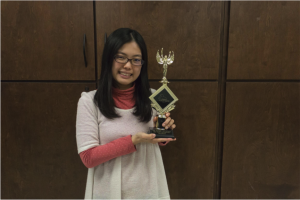by Alisa Thorsen
When Kanako Otani first left Hiroshima, Japan, to study at Chico State, she was afraid she would face discrimination on a daily basis. To Otani’s surprise, she found that the culture in the United States was very open, expressive and diverse.

“Here, I can pursue whatever I want and be whoever I want to be,” said Otani, who came to the United States four years ago. “In Japan we practice collectivism, so everyone tries to be the same. If you do something different you might be considered weird and a lot of people don’t like that.”
Otani, a communications major who graduated with a bachelor’s degree this spring, feels that she made the right decision to come to the United States. Her family and friends from Japan agree.
“They say I fit in here perfectly,” Otani said. “They used to joke that I was weird in Japan, but here, I fit right in.”
One thing that Otani likes about the United States is how involved the younger generations are in politics. Otani said that it is odd for a young person in Japan to state their political beliefs, even in front of friends or family.
“American people express their opinions much more than people in Japan,” Otani said. “Especially the young people. They go to vote, they use social media to share their opinions. Based on my experience, I don’t see much of that from young people in my home country.”
Otani feels that she is able to more freely express herself in the United States. This is part of the reason Otani joined the Chico State Speech and Debate Team, which has given her a platform to convey her views.
The topics Otani spoke on were shaped by experiences she had in the United States. She won an award for a speech that focused on Asian fetishism, the idea that American men solicit Asian women because they believe they will be submissive. She has also spoken on accent discrimination and how her accent has impacted her life in the United States.
Otani has impressed audiences and peers alike, said Sue Lowrie, the director of the Speech and Debate Team who has worked closely with Otani. Even though Lowrie was Otani’s coach, she learned a lot from her student’s enthusiastic spirit.
“I am impressed with Kanako’s willingness to take risks in all aspects of her education,” Lowrie said. “She has taught me that challenges, when taken as opportunities, can be a pathway to success. She takes each task as an opportunity. Her enthusiasm is often contagious.”
Lowrie was not the only person inspired by Kanako’s determination and positive attitude. Ann Schwab, a program director for Community Action Volunteers in Education (CAVE), mentored Otani through her volunteering experience at Chico State.
“Kanako steps outside of her comfort zone and explores possibilities. I admire her enthusiasm and energy. She’s embracing opportunities and enjoying the variety of interesting life choices,” Schwab said.
It wasn’t until the 2016 presidential election that Otani became worried she would encounter outright discrimination. The political turmoil and distinct divide of political values made Otani nervous. Fortunately, she said, nothing has changed in her life since the election.
“It was an interesting time to observe American people,” Otani said of election night 2016. “There is definitely still racism in America, but I hope that is changing.”
Otani said that her friends and family worried about her living overseas as well.
“My family always tells me to be careful because of the gun culture in the United States,” Otani said. “They hear about all the shootings that happen and they worry about me. I was shocked when I heard that people carry guns with them or keep them in their car. That is not how it is in Japan.”
Regardless of her fears, Otani still finds the value in being able to express one’s beliefs no matter how different they may be from others’.
Otani hopes to stay in the United States after graduation. She feels that going to school in the U.S. has given her a sense of identity that she may not have been able to celebrate in Japan.
“The word identity is used a lot in the United States,” Otani said. “Everyone has their own and gets to choose it and that is one really positive thing about America.”
Alisa Thorsen graduated this spring with a bachelor’s degree in journalism from Chico State. She wrote this article as part of a Tehama Group Communications team working with ChicoSol.
